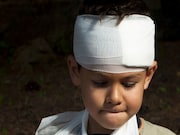Parents in decision aid group had less decisional conflict, were more involved in decision-making
WEDNESDAY, Sept. 26, 2018 (HealthDay News) — Use of a decision aid can improve parent knowledge for children with minor head injury at intermediate risk of clinically important traumatic brain injury (ciTBI), according to a study published online Sept. 21 in JAMA Network Open.
Erik P. Hess, M.D., from the University of Alabama at Birmingham, and colleagues compared a decision aid with usual care in parents of children at intermediate risk for ciTBI. A total of 172 clinicians caring for 971 children with minor head trauma were randomized to shared decision-making facilitated by the Head CT Choice decision aid or usual care (493 and 478, respectively).
The researchers found that, compared with usual care, parents in the decision aid arm had greater knowledge (mean questions correct, 6.2 versus 5.3), exhibited less decisional conflict (mean decisional conflict score, 14.8 versus 19.2), and were more involved in computed tomography decision-making (observing patient involvement score: mean, 25.0 versus 13.3). There was no significant difference between the emergency department computed tomography rate (decision aid, 22 percent versus usual care, 24 percent); the decision aid arm had a lower mean number of imaging tests at seven days after injury. There were no children with missed ciTBI.
“Use of a decision aid in parents of children at intermediate risk of ciTBI increased parent knowledge, decreased decisional conflict, and increased involvement in decision-making,” the authors write.
Copyright © 2018 HealthDay. All rights reserved.








